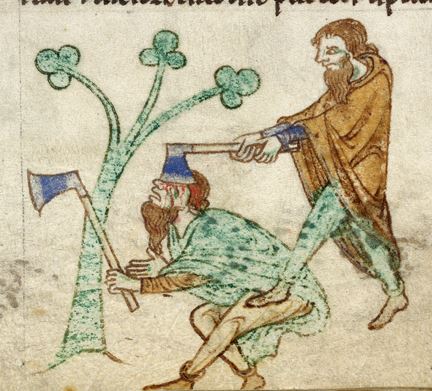In Ciaran Carson’s recent Penguin translation of Táin Bó Cúailgne (‘The Cattle Raid of Cooley’), there is an endnote explaining the odd origins of Cú Chulainn’s weapon, the gae bolga. This is a barbed spear that only the hero of this great epic can use. Interestingly for the history of sexuality, the note adds:
Fer Diad dies when Cú Chulainn penetrates ‘the rear portal of his body’ with the gae bolga. Philip Bernhardt-House, emphasising the arguably homoerotic relationship between Cú Chulainn and Fer Diad, has this to say: ‘Bolga’ either means ‘sack’ or ‘swell’; thus the gae bolga is ‘the spear of swelling’ (an erect penis) or ‘the spear of the sack’ (penis and scrotum); somewhat vulgarly put it is quite literally ‘the gay bulge’.

Cú Chulainn and Fer Diad are foster-brothers. The foster-brother relationship is the closest one in medieval Ireland. Foster-brothers defended each other in law, on the battlefield and against rivals. Given the frequency with which close male relationships like this are depicted in medieval literature, the desire to find homoeroticism is unsurprising. Indeed, there is much in the relationship between Fer Diad and Cú Chulainn that we might be tempted to read as homoerotic. However, I would suggest that this reading does not stand. It may make a fun bilingual pun, but when looking for the homoerotic in medieval texts it is important to know where we can’t see it, and not just where where we can.
The reading of homoeroticism between Fer Diad and Cú Chulainn fails when seeking to connect the love that they express for each other with the sexualised ending to Fer Diad’s life. Similar expressions of love between foster brothers are found throughout medieval Irish literature as the valorisation of this relationship. But Fer Diad’s death through anal penetration is better understood not as related to this relationship, but instead as part of the bodily humiliation Cú Chulainn metes out to his enemies.
Although Cú Chulainn and Fer Diad are tied by this closest of bonds, the foster-brothers find themselves on opposing sides of the great conflict described in the Táin. When they meet in single combat, it is with great mutual sorrow. The heightened emotional tension of the scene is conveyed in the poetic verses they address to one another. Cú Chulainn tries to dissuade his erstwhile comrade from fighting:
When we stayed with Scáthach
we were never apart
in courage or in war.
We shared the same heart.
You were my best comrade.
We breathed the same air.
You were dear above all.
I’ll miss you, I swear.
These verses describe heightened emotions that are similar to the feelings shared by real-life medieval foster brothers, not just this fictional pair. We can see this in the poetry of Fearghal Óg Mac An Bhaird when mourning the death of his foster brothers who fell at the battle of Dún in 1260. His use of imagery recalls the ‘same heart’ that Fer Diad and Cu Chulainn shared:
A grief to me is the loss of all those men,
But a grief many times over was the loss of yellow-haired Ó Cathain;
That prince was as the pulse in my head,
His blood means a loss I can not bear.
If these emotional laments and oft expressed love were part of the socially accepted notion of foster siblings’ relationship, what then do we make of Cú Chulainn thrusting his spear into the backside of his foster brother Fer Diad?
Looked at in isolation, Fer Diad’s anal penetration might seem to point to sublimated sexual desire. Contextualising the act with other instances in the Táin where Cú Chulainn kills his enemies, however, shows that this is not the first instance of humiliating deaths meted out at Cú Chulainn’s hand. Earlier, he wrestles with Láiríne in a ford, squeezing him ‘until he drove his excrement out of him and the water of the ford was turbid with his dung and the air of the firmament was polluted with his stench’. In another confrontation with Etarcomol he cuts the clothes from his body and throws him over on his backside before splitting him in two. Such pride in humiliating one’s enemies is not the sole preserve of Cú Chulainn. In The Tale of Mac Da Thó’s Pig, Cét takes pride in having speared Celtchair through the testicles so he can no longer father children.
No doubt our reading of Fer Diad’s humiliation is inflected by contemporary concerns over homosexuality, but we should not let that colour our reading of Fer Diad and Cú Chulainn’s previous relationship, nor obscure the significance of enemies’ humiliating deaths. These men shared a close, emotionally charged foster-brother relationship that was brought to a tragic end when they were forced to meet as enemies. Rather than a tool of homoerotic penetration, perhaps sometimes a ‘gay bulge’ is just a gae bolga.
Tom O’Donnell is a PhD candidate at University College London. He works on childbirth and child-rearing in medieval Europe, concentrating especially on twelfth- and thirteenth-century Ireland. He tweets as @tomod14

NOTCHES: (re)marks on the history of sexuality is licensed under a Creative Commons Attribution-NonCommercial-NoDerivatives 4.0 International License.
Based on a work at www.notchesblog.com.
For permission to publish any NOTCHES post in whole or in part please contact the editors at NotchesBlog@gmail.com





